| | Saudi Arabia’s de facto leader goes on a Washington diplomatic push, Trump reverses position and cal͏ ͏ ͏ ͏ ͏ ͏ |
| |  | Flagship |  |
| |
|
The World Today |  - MBS courts White House
- Trump’s Epstein volte face
- Ecuador drug boss captured
- Rains bring ‘misery’ to Gaza
- Japan’s economy shrinks
- China’s domestic luxury
- S&P raises ratings in Africa
- Europe’s fintech boom
- Youth hypertension up
- Alcaraz-Sinner rivalry
 The London Review of Substacks, and a hotel in a former public toilet. |
|
Saudi Arabia courts Washington |
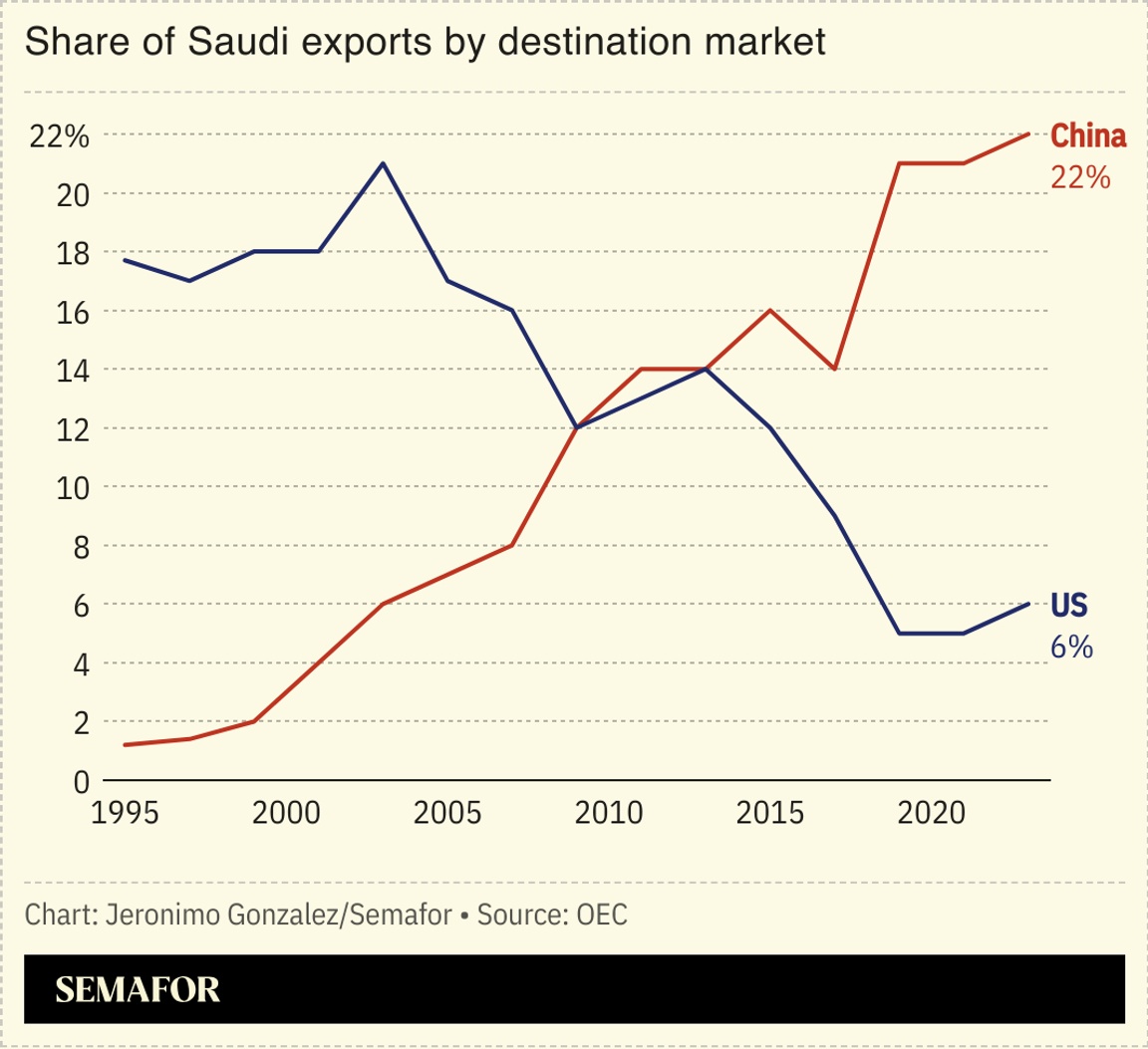 Saudi Arabia’s de facto ruler kicks off a diplomatic offensive in Washington this week, seeking to cement a deepening alliance with a raft of proposed deals. Crown Prince Mohammed bin Salman is pursuing a defense guarantee, a nuclear agreement, and greater access to cutting-edge chips to fuel the kingdom’s economic diversification and AI ambitions. Once a pariah over the murder of a Saudi journalist, MBS now enjoys strong relations with the US, won over by Saudi’s social transformation, economic potential, and stores of energy needed to power data centers. But despite closer ties, MBS must still ensure that “all the goodwill he has built up in the Trump era continues into future administrations,” Semafor’s Saudi bureau chief noted. |
|
Trump’s volte face on Epstein files |
 Jonathan Ernst/File Photo/Reuters Jonathan Ernst/File Photo/ReutersUS President Donald Trump urged Republicans to vote to release files related to the sex offender Jeffrey Epstein, saying “we have nothing to hide,” in a sharp reversal of his previous position. The move may be designed to avoid a potential embarrassment: Dozens of Republican lawmakers were expected to back a measure to publish the files this week, which would have undermined Trump’s authority. The president’s approval ratings have plunged; voters blame Republicans for the shutdown, and they are bearing the brunt of high prices. His former friendship with the disgraced financier is another problem: Emails were recently released in which Epstein said Trump “knew about the girls.” |
|
Spain captures Ecuador drug boss |
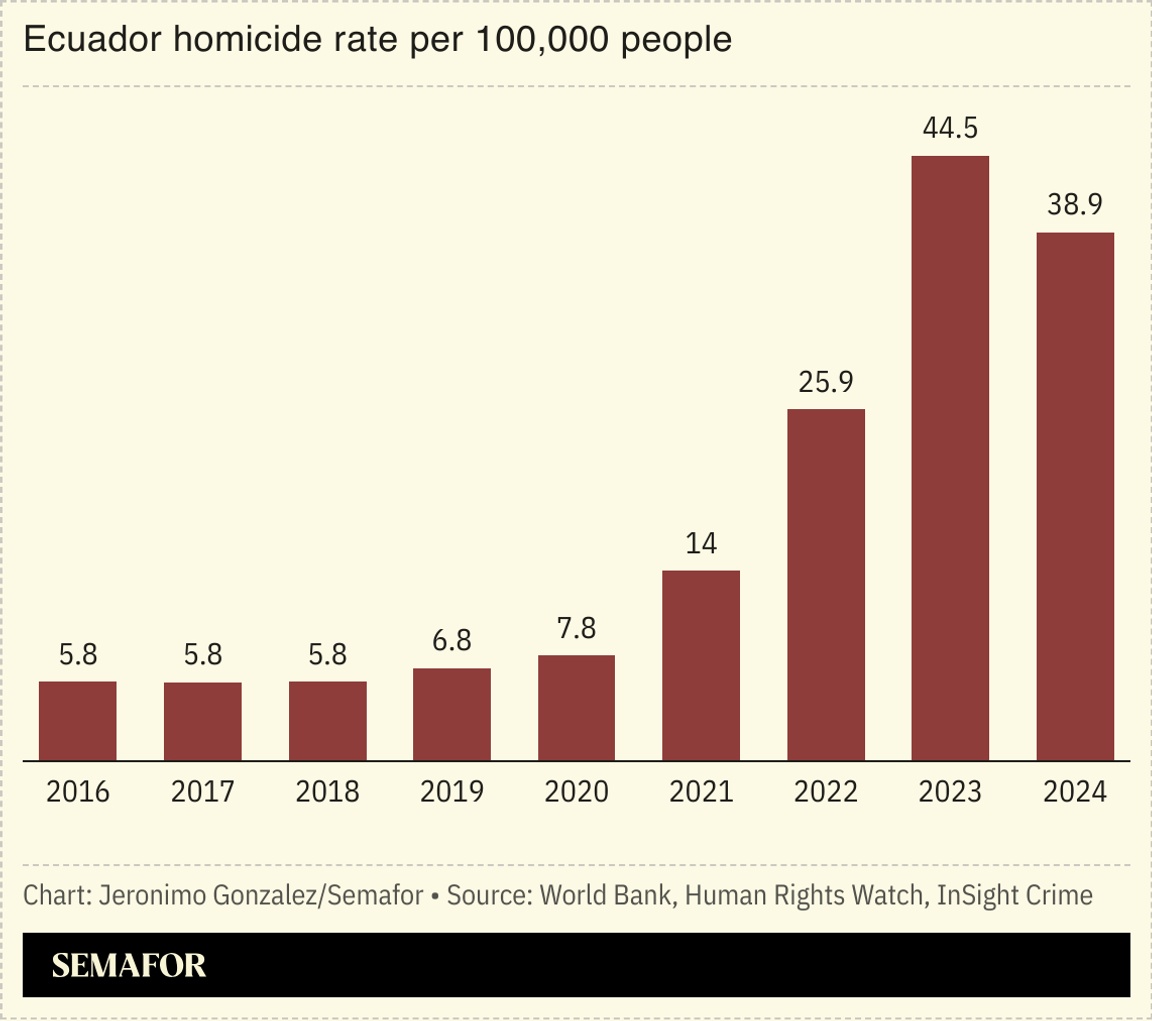 Spanish police captured the leader of one of Ecuador’s biggest drug trafficking cartels, a major coup in a global crackdown on narcotics. Wilmer “Pipo” Chavarria headed Los Lobos, a group with ties to some of the world’s biggest transnational drug cartels, responsible for trafficking hundreds of tons of cocaine to the US and Europe. Around 70% of the world’s cocaine now passes through Ecuador’s ports, with the fight for control of trafficking routes sending murder rates there soaring. The arrest came as the US said it will designate a cartel that Washington alleges is run by Venezuelan President Nicolás Maduro as a foreign terrorist organization, potentially giving the White House legal authority to ramp up its military campaign against the country. |
|
Heavy rains bring ‘misery’ to Gaza |
 Dawoud Abu Alkas/Reuters Dawoud Abu Alkas/ReutersHeavy rains lashed Gaza over the weekend, worsening already bleak conditions for the territory’s residents as temperatures drop. Despite a ceasefire agreed last month, aid organizations say Israel is still limiting the supply of critical goods needed to alleviate a humanitarian catastrophe resulting from the two-year war in the enclave. Tents — erected because some 200,000 structures were destroyed during the conflict — have flooded, just as winter sets in, amplifying a displacement crisis and piling “misery on top of misery,” as a top UN official put it. The warnings came as the UN Security Council weighed a US-sponsored resolution on the truce, which notably includes language acknowledging a future Palestinian state. |
|
Japan’s economy shrinks in Q3 |
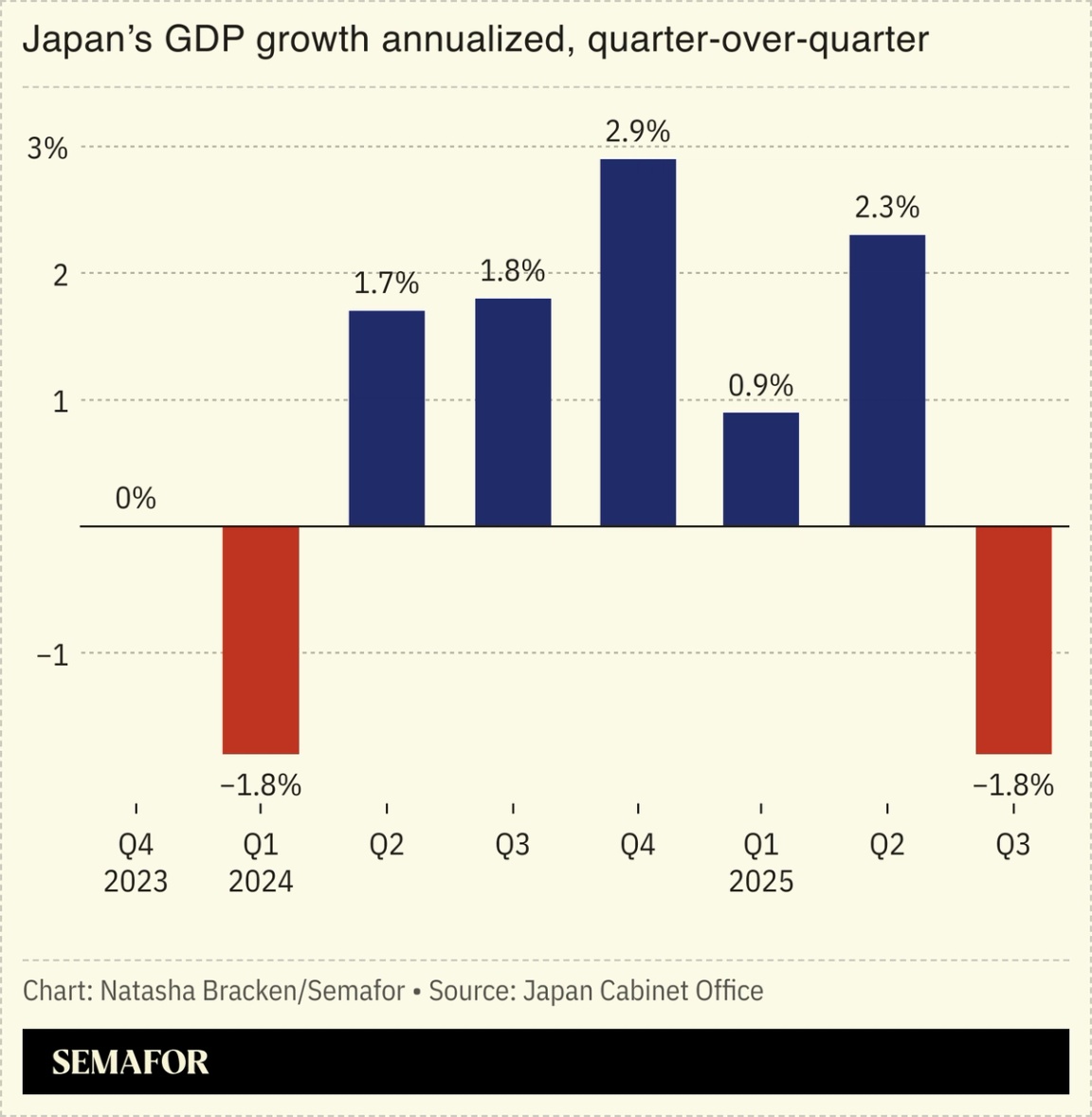 Japan’s economy shrank by 1.8% in the third quarter compared to the same period last year, as trade tensions with the country’s two biggest export markets dragged on sales. Though the figures were better than expected, they nevertheless pointed to the impact US tariffs have had on Japanese exports. Meanwhile, Japanese Prime Minister Sanae Takaichi’s recent comments that her country could respond militarily were China to invade Taiwan — a self-ruled island Beijing claims as its own — are threatening ties between the Asian nations. In a bid to ease the row, Tokyo sent a trade envoy to Beijing today. Japan also faces major domestic challenges: Despite flatlining consumption, inflation stood at 2.9%, significantly above the Bank of Japan’s target. |
|
China’s homegrown luxury boom |
 Florence Lo/Reuters Florence Lo/ReutersChinese shoppers are increasingly turning to homegrown luxury brands, a blow to heritage US and European giants which have come to rely on the country’s huge market. E-commerce sales of the high-end Chinese brand Laopu Gold have surged 1,000% so far this year compared to 2023, and other firms have seen large, if less spectacular, rises. Meanwhile Gucci, Michael Kors, and other Western brands have seen their takings fall. China’s slowing economy has already hit the luxury market — LVMH’s shares are down 30% from their 2023 peak. The big names are trying to fight back: L’Oréal bought a stake in a Chinese skincare firm, as “C-Beauty” brands take an ever larger market share. |
|
S&P improves ratings in Africa |
 South African President Cyril Ramaphosa. Leah Millis/Reuters South African President Cyril Ramaphosa. Leah Millis/ReutersS&P Global improved its outlook on sub-Saharan Africa’s two biggest economies, an indication that painful economic reforms are starting to pay off. S&P lifted South Africa’s credit rating for the first time in two decades, pointing to efforts by Pretoria to increase its tax take and curb the growth of debt. The country, however, is still grappling with steep US tariffs as well as slow growth and persistently high unemployment. Separately, S&P upgraded its outlook on Nigeria from “stable” to “positive.” Abuja’s scrapping of a costly fuel subsidy — which sparked massive anti-government protests — and the removal of currency restrictions have sparked economic growth and foreign capital inflows. |
|
FlatPay reaches ‘unicorn’ status |
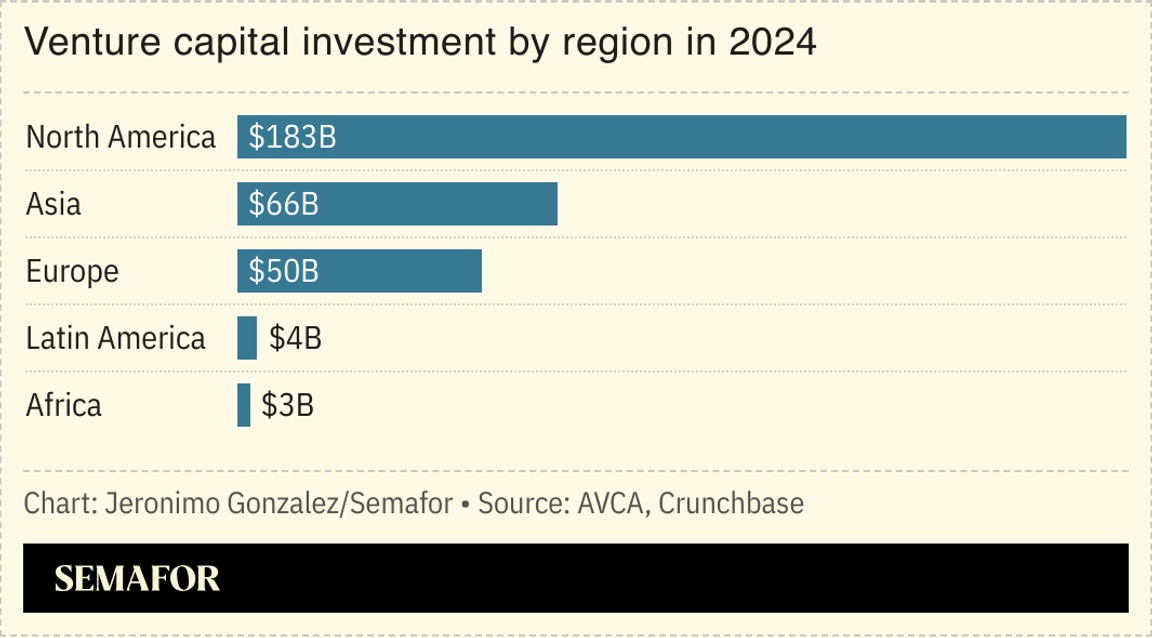 The Danish fintech firm FlatPay became the latest European “unicorn” startup valued over $1 billion. While Europe generally trails the US in tech — it has just four $100 billion companies to the US’ 33 — it does rather better in the financial technology sector. Several of the biggest banking apps, including Klarna, Monzo, and Revolut, are Europe-based. The US has its own giants, such as Stripe, but its dominance is less extreme than in other areas. European legislation forced legacy banks to open up their software interfaces, giving startups room to innovate, and the continent’s fragmented banking market has meant there were more inefficiencies for new entrants to solve. Europe’s rapid adoption of digital payments also smoothed fintech’s progress. |
|
Hypertension rates grow among youth |
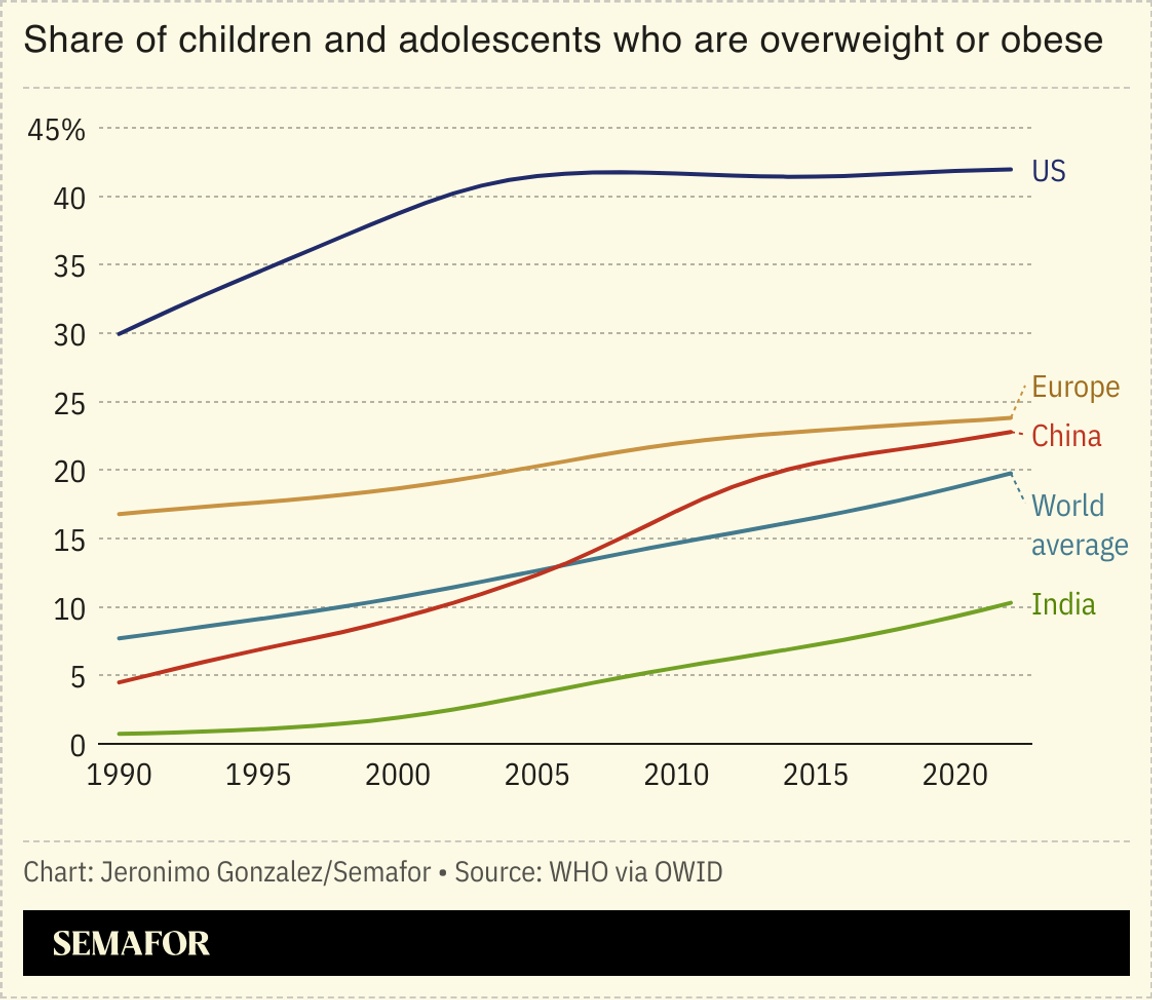 High blood pressure rates recorded among young people worldwide nearly doubled in 20 years, research found. The work collated existing research and found that between 2000 and 2020, the percentage of under-19s with hypertension went up from around 3% to around 6%. The condition is associated with raised risk of cardiovascular disease in later life. The researchers said that rising childhood obesity, salt intake, and sedentary behaviour could be driving the increase. Another recent paper found broadly similar results. A likely factor is that screening and measurement have improved, meaning more cases of hypertension are detected than in the past, but the evidence suggests the rise is largely real. |
|
|